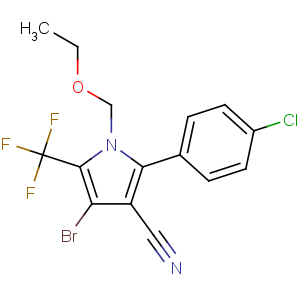References of 4-bromo-2-(4-chlorophenyl)-1-(ethoxymethyl)-5-(trifluoromethyl)pyrrole-
3-carbonitrile
Title: Chlorfenapyr
CAS Registry Number: 122453-73-0
CAS Name: 4-Bromo-2-(4-chlorophenyl)-1-(ethoxymethyl)-5-(trifluoromethyl)-1
H-pyrrole-3-carbonitrile
Manufacturers' Codes: AC-303630; CL-303630
Trademarks: Pirate (BASF); Stalker
Molecular Formula: C15H11BrClF3N2O
Molecular Weight: 407.61
Percent Composition: C 44.20%, H 2.72%, Br 19.60%, Cl 8.70%, F 13.98%, N 6.87%, O 3.93%
Literature References: Halogenated pyrrole mitochondrial uncoupler. Prepn: D. G. Brown
et al., BR 8803788;
eidem, US 5010098 (1988, 1991 both to Am. Cyanamid). Chemical and biological properties: J. B. Lovell
et al., Brighton Crop Prot. Conf. - Pests Dis. 1990, 37. Summary of field trials: T. P. Miller
et al., ibid., 43. Field trials on apples: Y.-J. Ahn
et al., Appl. Entomol. Zool. 31, 67 (1996). Mechanism of action: B. C. Black
et al., Pestic. Biochem. Physiol. 50, 115 (1994).
Properties: White solid, mp 91-92°. Sol in acetone, diethyl ether, DMSO, THF, acetonitrile, alcohols. Insol in water. Log P ~5. LD50 (single dose) in male, female rats (mg/kg): 223, 459 orally; in rabbits: >2000 dermally (Lovell). LC50 in Japanese carp: 0.5 ppm (Lovell).
Melting point: mp 91-92°
Toxicity data: LD50 (single dose) in male, female rats (mg/kg): 223, 459 orally; in rabbits: >2000 dermally (Lovell); LC50 in Japanese carp: 0.5 ppm (Lovell)
Use: Insecticide. Acaricide.

